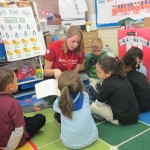“We need to get ahead of this crisis to survive and thrive together. It is time to provide alternate options in education preparation so we can continue to prepare high-quality leaders and teachers within this ‘new normal,'” says Patricia Virella, a Ph.D. student at the Neag School and faculty member at Sarah Lawrence College’s Art of Teaching Program.
We recently spotted a great quote from James C. Kaufman, a Professor of Educational Psychology at the University of Connecticut that said: “If creativity is a light, it does not have an on/off switch.”
Students need to feel safe and have supportive relationships for their social, emotional, and academic learning to be optimized. Students experiencing trauma, such as from public health crises, weather disasters, or other upsetting events, may have been exposed to unpredictable schedules, inconsistent supervision, or food insecurity and desperately need school to be their safest, most predictable, and most positive setting, especially if they have been displaced or are without utilities or basic comforts.
The University of Connecticut’s Administrator Preparation Program (UCAPP) aims to be a leading leadership program—with a curriculum that guides its students through rigorous, relevant learning experiences so they are prepared to serve as leaders and champions of equity on their first day on the job.
In this post, Dr. Richard Gonzales, director of the university’s educational leadership preparation programs, describes why the university decided to participate in the initiative, its general approach to the work, and the effects it is seeing so far. Other posts include descriptions of efforts to redesign curricula and internships, students’ and faculty members’ views about the new design, and the ways in which the university works with community partners to ensure it is meeting their needs.
The 5l-year-old CEO of sister companies Sound Manufacturing and Monster Power Equipment in Old Saybrook, Kellie-Marie Vallieres, took over the family business from her father in 2006. She never planned to run the company, but when earning her Ph.D. in adult experiential learning at UConn she did a class project on Sound Manufacturing, which makes precision sheet metals for a variety of industries – landscaping, telecommunications, industrial, automotive, etc.
University of Connecticut psychology professor James C. Kaufman, an expert in creativity research, in a Psychology Today post, sees people sheltering in place exhibiting “an increase in everyday creativity.” Although he lists a hierarchy of creative achievements, from “the family singing a song from ‘Les Miserables’” to publishing a “book about kiwi cultivation,…it is important not to let such a comparison diminish their value.”
Since schools shut down, students have been called the “hobbled” generation and the “covid class.” They have been told they have or will experience covid-related slides, losses, gaps and other deficiencies that are “disastrous.” They have been told that they are frying their brains by using phones, tablets and other devices to stay connected to friends, culture and a sense of normalcy, and that they are learning less than they should or close to nothing at all.
They should be told the opposite.
Grace Beshlian and Alyssa Conklin will return to the UConn women’s lacrosse program for the 2021 season as announced by head coach Katie Woods. Both will return after the NCAA’s decision to grant spring athletes another year of eligibility.
Ann Traynor, the director of advising and certification for UConn’s Neag School of Education, says students graduating this spring have begun creating online lesson plans to show prospective employers, and school professors are helping critique the lessons.


